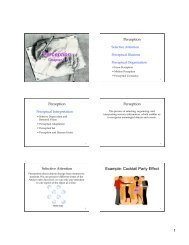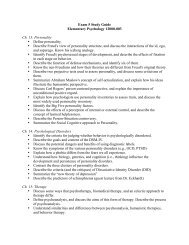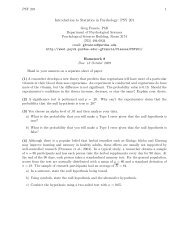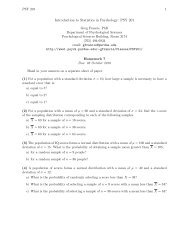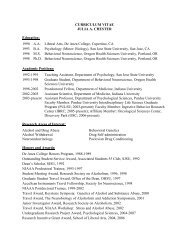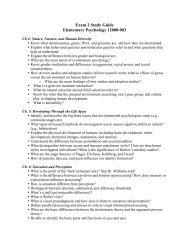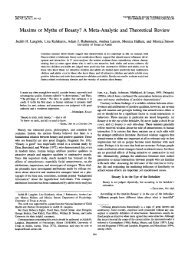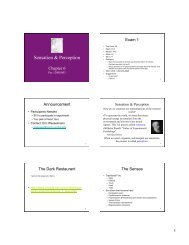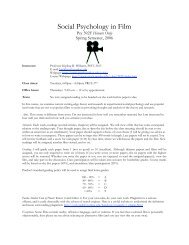Introduction to Cognitive Psychology - Department of Psychological ...
Introduction to Cognitive Psychology - Department of Psychological ...
Introduction to Cognitive Psychology - Department of Psychological ...
Create successful ePaper yourself
Turn your PDF publications into a flip-book with our unique Google optimized e-Paper software.
Pr<strong>of</strong>. Greg Francis 1/2/13Memory discriminationPSY 200Greg FrancisLecture 19DiscriminationMany cognitive tasks require you <strong>to</strong>discriminate between events/stimuli Is this a real smile? Is this fruit ripe? Is the stapler on the desk?The same kind <strong>of</strong> discrimination is required for memoryHow <strong>to</strong> take a test.Purdue UniversityPurdue UniversityDiscriminationFalse memoryDiscrimination is difficult because memoriescan come from lots <strong>of</strong> different sourcesConsider so-called False memory studies as in CogLab subject views a list <strong>of</strong> words the list <strong>of</strong> words have something in common» they are all related <strong>to</strong> a target wordAn example list is smooth, bumpy, road, <strong>to</strong>ugh, sandpaper, jagged, ready,coarse, uneven, riders, rugged, sand, boards, ground,gravel the special target is rough, which is not shown <strong>to</strong> thesubjectAfter viewing the list, the subject must go through aset <strong>of</strong> words and identify which ones were in thejust seen list some words were in the list some words were not seen» including the special targetPurdue UniversityPurdue UniversityFalse memoryFalse memoryThe main finding is that the special target is <strong>of</strong>tenidentified as part <strong>of</strong> the just seen list even though it was notSometimes people will even report that theyrecall seeing the special target but this is impossible because it was never shownCogLab data (193 participants) Type <strong>of</strong> selected items ! !Percentage <strong>of</strong> recalls! In original list ! ! !75.5! Normal distrac<strong>to</strong>r (not in list) ! 7.4! Special distrac<strong>to</strong>r (not in list) !70.3!Purdue UniversityThese types <strong>of</strong> findings suggest that ourmemories are not necessarily accurate, we can remember things thatnever occurred able <strong>to</strong> be manipulated, <strong>to</strong> a certain extent, I can makeyou have certain memoriesWhy does the false memory effecthappen?Purdue UniversityPSY 200: Intro. <strong>to</strong> <strong>Cognitive</strong> <strong>Psychology</strong> 1



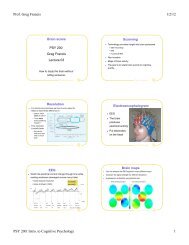

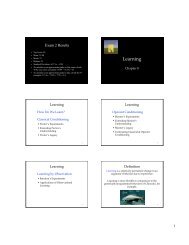
![Exam 4 Study Guide[1]](https://img.yumpu.com/45196739/1/190x245/exam-4-study-guide1.jpg?quality=85)
